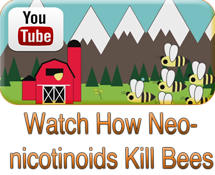June 2014 Neonicotinoids residues in food!
18 June 2014
Chen et al. have recently published a study presenting the results of residue testings in fruit, vegetables, honey and pollen in the US (and New Zealand for pollen). The results of this study are highly worrying as on the one hand, the majority of fruits and vegetables are contaminated and on the other, pollen is very frequently contaminated at levels that may be toxic to bees (a few µg/kg). Food contamination reached levels up to 100 µg/kg in apples, which very high.
Neonicotinoids are suspected to be linked to human neurological disorders (Kimura-Kuroda et al. 2012, Abou-Donia et al. 2008) and no long-term, multi-generational studies have been performed before authorising these chemicals.
Abstract (Full publication not freely available)
In this study, we quantitatively measured neonicotinoids in various foods that are common to human consumption. All fruit and vegetable samples (except nectarine and tomato) and 90% of honey samples were detected positive for at least one neonicotinoid; 72% of fruits, 45% of vegetables and 50% of honey samples contained at least two different neonicotinoids in one sample, with imidacloprid having the highest detection rate among all samples. All pollen samples from New Zealand contained multiple neonicotinoids and 5 out of 7 pollen from Massachusetts detected positive for imidacloprid. These results show the prevalent presence of low level neonicotinoid residues in fruits, vegetables and honey that are readily available in the market for human consumption and in the environment where honeybees forage. In light of the new reports of toxicological effects in mammals, our results strengthen the importance to assess dietary neonicotinoid intakes and the potential human health effects.

